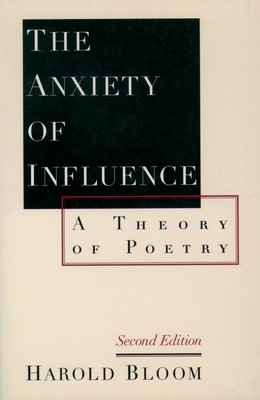
- We will send in 10–14 business days.
- Author: Harold Bloom
- Publisher: Oxford University Press, USA
- Pages: 204
- ISBN-10: 0195112210
- ISBN-13: 9780195112214
- Format: 13.5 x 20.4 x 1.1 cm, minkšti viršeliai
- Language: English
- SAVE -10% with code: EXTRA
Reviews
Description
Harold Bloom's The Anxiety of Influence has cast its own long shadow of influence since it was first published in 1973. Through an insightful study of Romantic poets, Bloom puts forth his central vision of the relations between tradition and the individual artist. Although Bloom was never the leader of any critical "camp," his argument that all literary texts are a response to those that precede them had an enormous impact on the practice of deconstruction and poststructuralist literary theory in this country. The book remains a central work of criticism for all students of literature and has sold over 17,000 copies in paperback since 1984. Written in a moving personal style, anchored by concrete examples, and memorably quotable, Bloom's book maintains that the anxiety of influence cannot be evaded--neither by poets nor by responsible readers and critics.
This second edition contains a new Introduction, which explains the genesis of Bloom's thinking and the subsequent influence of the book on literary criticism of the past twenty years.criticism of the past twenty years. Here, Bloom asserts that the anxiety of influence comes out of a complex act of strong misreading, a creative interpretation he calls "poetic misprision." The influence-anxiety does not so much concern the forerunner but rather is an anxiety achieved in and by the story, novel, play, poem, or essay. In other words, without Keats's reading of Shakespeare, Milton, and Wordsworth, we could not have Keats's odes and sonnets and his two Hyperions.
Given the enormous attention generated by Bloom's controversial The Western Canon, this new edition is certain to find a readymade audience among the new generation of scholars, students, and layreaders interested in the Bloom cannon.
EXTRA 10 % discount with code: EXTRA
The promotion ends in 23d.20:44:53
The discount code is valid when purchasing from 10 €. Discounts do not stack.
- Author: Harold Bloom
- Publisher: Oxford University Press, USA
- Pages: 204
- ISBN-10: 0195112210
- ISBN-13: 9780195112214
- Format: 13.5 x 20.4 x 1.1 cm, minkšti viršeliai
- Language: English English
Harold Bloom's The Anxiety of Influence has cast its own long shadow of influence since it was first published in 1973. Through an insightful study of Romantic poets, Bloom puts forth his central vision of the relations between tradition and the individual artist. Although Bloom was never the leader of any critical "camp," his argument that all literary texts are a response to those that precede them had an enormous impact on the practice of deconstruction and poststructuralist literary theory in this country. The book remains a central work of criticism for all students of literature and has sold over 17,000 copies in paperback since 1984. Written in a moving personal style, anchored by concrete examples, and memorably quotable, Bloom's book maintains that the anxiety of influence cannot be evaded--neither by poets nor by responsible readers and critics.
This second edition contains a new Introduction, which explains the genesis of Bloom's thinking and the subsequent influence of the book on literary criticism of the past twenty years.criticism of the past twenty years. Here, Bloom asserts that the anxiety of influence comes out of a complex act of strong misreading, a creative interpretation he calls "poetic misprision." The influence-anxiety does not so much concern the forerunner but rather is an anxiety achieved in and by the story, novel, play, poem, or essay. In other words, without Keats's reading of Shakespeare, Milton, and Wordsworth, we could not have Keats's odes and sonnets and his two Hyperions.
Given the enormous attention generated by Bloom's controversial The Western Canon, this new edition is certain to find a readymade audience among the new generation of scholars, students, and layreaders interested in the Bloom cannon.


Reviews